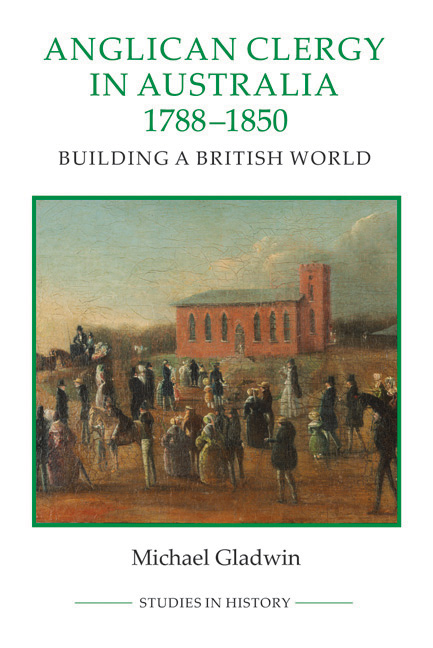Book contents
- Frontmatter
- Dedication
- Contents
- List of illustrations
- Acknowledgements
- Abbreviations
- Map
- Introduction
- PART I SINEWS: FUNDING, RECRUITMENT, BACKGROUNDS AND MOTIVATION, 1788-1850
- PART II CLERGYMEN IN COLONIAL AUSTRALIA, 1788-1850
- PART III SCENES OF COLONIAL CLERICAL LIFE: AUSTRALIAN CLERGYMEN AND VOLUNTARISM, 1836-50
- 8 The impact of voluntarism
- 9 Colonial quiverfuls: clerical family life
- 10 Clerical identity, laity and voluntarism
- Conclusion
- Bibliography
- Index
9 - Colonial quiverfuls: clerical family life
from PART III - SCENES OF COLONIAL CLERICAL LIFE: AUSTRALIAN CLERGYMEN AND VOLUNTARISM, 1836-50
Published online by Cambridge University Press: 05 December 2015
- Frontmatter
- Dedication
- Contents
- List of illustrations
- Acknowledgements
- Abbreviations
- Map
- Introduction
- PART I SINEWS: FUNDING, RECRUITMENT, BACKGROUNDS AND MOTIVATION, 1788-1850
- PART II CLERGYMEN IN COLONIAL AUSTRALIA, 1788-1850
- PART III SCENES OF COLONIAL CLERICAL LIFE: AUSTRALIAN CLERGYMEN AND VOLUNTARISM, 1836-50
- 8 The impact of voluntarism
- 9 Colonial quiverfuls: clerical family life
- 10 Clerical identity, laity and voluntarism
- Conclusion
- Bibliography
- Index
Summary
‘I heartily wish it could be accomplished’, wrote Broughton in 1839 of the ‘excitable’ Revd Charles Spencer's desire to marry. ‘But really all clerical appointments are so miserably inadequate that I hardly know what to say to the prudence of it unless there be something else, however little, to depend on … I am much depressed by the prospect … of introducing what Sydney Smith calls a … generation of beggars.’
Although the general consensus on colonial clergymen (as well as on most foreign missionaries) was that married men were steadier, Broughton was well aware of the challenges that the tenuous nature of colonial clerical life posed to families. Of Tasmania Fry wrote that although no place more required the ‘activity of unencumbered youth’, the best provision for young clergymen would be found ‘not in the salary but in the numerous well-apportioned partners which the settlers would be ready to accommodate them with’ (Fry's later wife, Catherine, was one). Noting that he could offer only £160 per annum for a Fremantle clergyman, Wittenoom advised sending a single man, adding that even £250–300 per annum was ‘very inadequate’ for maintaining a family.
Clergy wives
Anne O'Brien has argued that of all colonial Anglican women, clergy wives ‘juggled the needs of home and community most consistently’. Clergy wives had public roles in support of husbands that made many ‘unpaid curates’. This was combined with ‘domestic Christianity’, an outlook and praxis which implied the home as partner with the Church in Christian mission, valuing women as keepers of the home and defining motherhood as ‘their ultimate vocation’. As mothers, spirituality was expressed through the home and children, a concern which extended to indigent mothers and children, both European and Aboriginal. Apart from raising a family of thirteen, Ann Rusden (herself a Berkshire clergyman's daughter) worked as a schoolmistress and regular pastoral visitor in Maitland.
- Type
- Chapter
- Information
- Anglican Clergy in Australia, 1788–1850Building a British World, pp. 190 - 201Publisher: Boydell & BrewerPrint publication year: 2015

